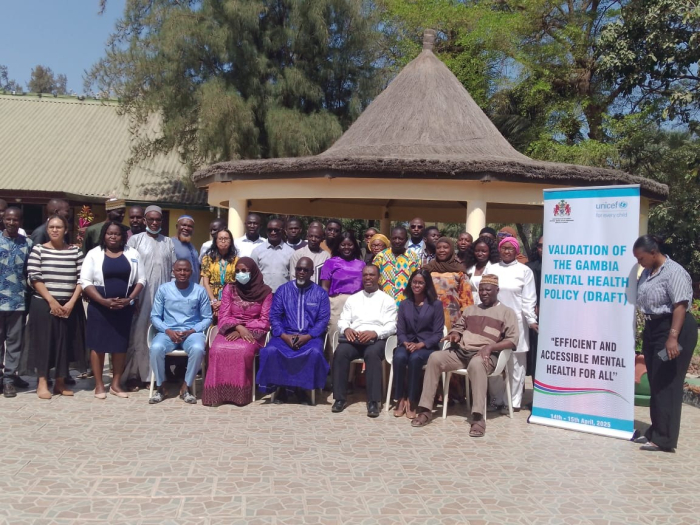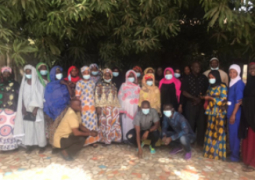
It would be recalled that the last Mental Health Policy was validated in 2007 and became outdated. Since then, significant strides have been made in understanding mental health needs and this updated policy reflects current challenges, evidenced-based practices and commitment to equitable and integrated mental healthcare.
Welcoming the gathering, Manjarra Marega, programme manager NMHP at the Ministry, recalled that 17 years since the 2007 policy, the country stands at a cross juncture, armed with lessons learn and determined to do better.
The 2007 policy, she said, made an important ground work but that implementation showed there exists some critical gaps.
These gaps, she went on, includes limited mental health were materialized, but that mental health services are largely centralized leaving regions such as North Bank Region, East, West and Central River Region on the south.
She also talked about chronic under funding with less than 2 percent of the health budget allocated to mental health, saying engaging communities to reduce stigma lacks sustained community engagement.
This new policy, she added, aims to implement result that would have positive impact on Gambians, with plans to revitalize the country’s community mental health services to reach wider communities.
Giving an insight into the development of this new draft document, Gibril Jarjue, Director of Planning and Information at the Ministry, revealed that the development of this new mental health draft has been guided by a structured and an inclusive process ensuring that the policy is both evidenced-based and responsive to the needs of the people of The Gambia.
“Central to this process has been the mental health investment case which will be launched soon. This investment case provides a strong foundation for policy decision by outlining the economy and social benefits of investing in mental health services.”
This case, he added, DPL Director added, highlights the long-term value of strengthening mental health infrastructure, increasing services accessible and promoting the overall wellbeing of people and communities.
Dr. Fatoumatta Dibba, deputy director of Health Services, acknowledged that mental health issues is a collective business of all as the disease is such that ‘we are all affected in one way or the other.’
She described the new draft policy as ‘timely and consultative’ in view of the fact that this to have a policy that will guide as a country at this stage is crucial.
Dr. Dibba expressed delight that all the stakeholders are consulted in the drafting of this new document, adding that now the policy has been drafted and the team and stakeholders gathered to look at it again is indeed great.
She while calling on development partners to support them so as to make it a reality amid the current global financial shocks.
Amadou Camara, Chairman of the National Assembly Select Committee on Health, underscored the importance of the event, further commending officials for making the process of drafting this draft report a ‘consultative one.’
He spoke of the committee’s resolve to continue supporting the Ministry in delivering health care to Gambians.
Armand Gnahore, deputy representative of UNICEF in The Gambia, on behalf of UNICEF expressed gratitude to the Ministry for their unwavering commitment to improving mental health care in the country.
“As we all know mental health is a cornerstone of the overall wellbeing and its importance cannot be overstated. Therefore, the review and validation of this National Mental Health Policy marks a significant milestone in our collective efforts to ensure that every individual especially children to have access to mental support they need.”
He disclosed that UNICEF has been privilege to provide financial and technical support through the project, acknowledging that this is possible thanks to the good and strong collaboration and partnership with the Ministry.
Gnahore observed that children and adolescent are particularly vulnerable to mental health challenges, adding that they are faced with unique pressure that could impact their mental wellbeing.
In his opening statement, Dr. Yusupha Touray, permanent secretary one at the Ministry, reiterated that mental health problem is a collective burden on all and called on all to start taking it seriously.
The move, he added, represents ‘our collective commitment’ to build a nation where mental health is prioritize, stigma is eradicated and compassionate care is made accessible to all.
To this end, he on behalf of the Ministry extends gratitude to the UNICEF for the invaluable financial and technical support, which he said, has been instrumental in bringing this critical policy to fruition today.
This partnership, he added, also underscores their shared vision for a health and more inclusive future for all.
PS Touray also spoke of government’s resolve to support mental health issues in the country as demonstrated in the development of the New Mental Health Bill to replace the obsolete Lunatic Detention Act, a 1917 colonial document.
This, he added, also include integration and highlighting mental health into the recovery focused National Development Plan and the Health Sector Strategy Plan as well as the establishment of Mental Health Units in major health facilities to bridge existing gaps, among a host of others.





